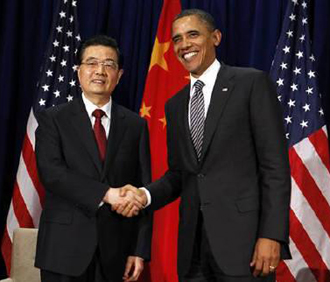Not long after taking office in 2009 Barack Obama called himself “America’s First Pacific President.” His reelection may turn on whether he can make Americans see that claim as something more substantive than a warm reference to his personal background.
Most Asian Americans know that Obama was born in Hawaii, and that as a boy he lived for four years in Indonesia with his mother and Indonesian stepfather. His younger sister is half Indonesian and his brother-in-law is Vietnamese American. Those personal connections to the Pacific are, of course, far more than any other US president can claim.
But by that claim Obama meant to express much more than a warm reference to his personal background. He meant to declare his vision for an America awakening to its role as a Pacific nation after spending most of its three centuries turned resolutely toward the Atlantic and Europe.
With good reason. About 81% of Americans claim descent from the Atlantic side of the world while only about 4.5% are descended from people from the other side (leaving aside the 13.5% or so who hail from Latin America — which too has its Atlantic and Pacific sides). It’s natural for America as a nation to feel stronger and warmer bonds with the lands across the Atlantic. That’s especially true because the biggest, most painful 20th Century wars — both hot and cold — were fought against Pacific nations.
So Obama laying claim to the title of America’s first Pacific president was no glib and easy piece of PR. If anything he was risking alienating that surprisingly large part of the American electorate that questions his citizenship and doesn’t like having a president who grew up under an Indonesian stepfather and was educated in Indonesian schools.
But Obama took the risk because, like any rational leader, he saw the handwriting on the wall long before he took office. Even before the 2008 crisis laid bare the precariousness of western Europe’s economic underpinnings, its decline was obvious, especially in comparison to Asia’s swift rise as the world’s economic growth center. If we are to enjoy continued prosperity the US has no choice but to loosen its economic ties to Europe and embrace Asia as both our main market and competition. To do otherwise would be to put lead sinkers on the prospects of America’s businesses and consumers.
The high cost of facing the wrong direction is evident in the extreme economic uncertainty we’ve been suffering these past six months. That has more to do with our morbid fixation on waning economies like Greece and Italy than with our own economic ills. To continue going into paroxysms to every financial and political shockwave emanating from that part of the world amounts to buying ourselves an extra few years of growth-killing jitters. I’m not saying we’re insulated from Europe’s woes. Our exporters and banks do have some exposure there, especially to Italy’s $2 trillion economy. But our Euro exposure is a fraction of our exposure to the booms taking place in China, India and most of East Asia. It’s irrational to devote our energies to mourning the sunset rather than celebrating the sunrise — especially when we’re far closer to the sunrise than the sunset.
And that’s the irrationality that Obama’s bold claim to being our first Pacific president was meant to address. He knows better than anyone that his prospects for another four years turn on getting the voters to feel more confident by embracing the promise of Asia and the Pacific as our own. If he fails in that, his presidency will likely sink like the consumer confidence in Italy, Spain and Britain as each nation, in its turn, clamors for mass media headlines in coming months.
In an effort at getting Americans to embrace optimism and the future, Obama has done what he could to bring our Asian ties into the headlines. Unfortunately our mass media has its own laws of inertia. The summits and state dinners with the leaders of China, India and S. Korea barely received page-two coverage in most US media. It was hard to find any mention at all of Obama’s vigorous performance at the APEC Summit last weekend in Honolulu. Instead our front pages continue to dwell on the minutiae of Greek and Italian politics.
I don’t even see much about the upcoming East Asia Summit in Jakarta though America’s prospects for export growth will be impacted by the jostling that will take place over the Trans-Pacific Partnership (TPP), a huge free-trade zone that will ultimately tie our economy with those of two dozen or more Pacific nations.
“Ninety-five percent of the world’s consumers are beyond our borders,” President Obama declared in closing the APEC summit. “I want them to be buying goods with three word stamped on them: Made in America. So I have been doing everything I can to make sure that the U.S. is competing aggressively for the jobs and the markets of the future.”
At this very moment he’s locked in an important piece of drama in which the US is vying with China for the economic leadership of the Pacific Rim while trying to build a “seamless regional economy.”
“If we are not playing out here in the world’s largest regional economy and the world’s fastest [growing] regional economy, if we have abandoned the field and we are not engaged, American businesses will lose out and those jobs won’t be in the United States of America,” Obama said.
He can only hope that becoming the first US president to participate in the crucial East Asia Summit this weekend will help start turning the eyes and ears of America away from the depressing clamor in the Euro Zone and toward the growth and vitality the US can share on its other, more promising side.

